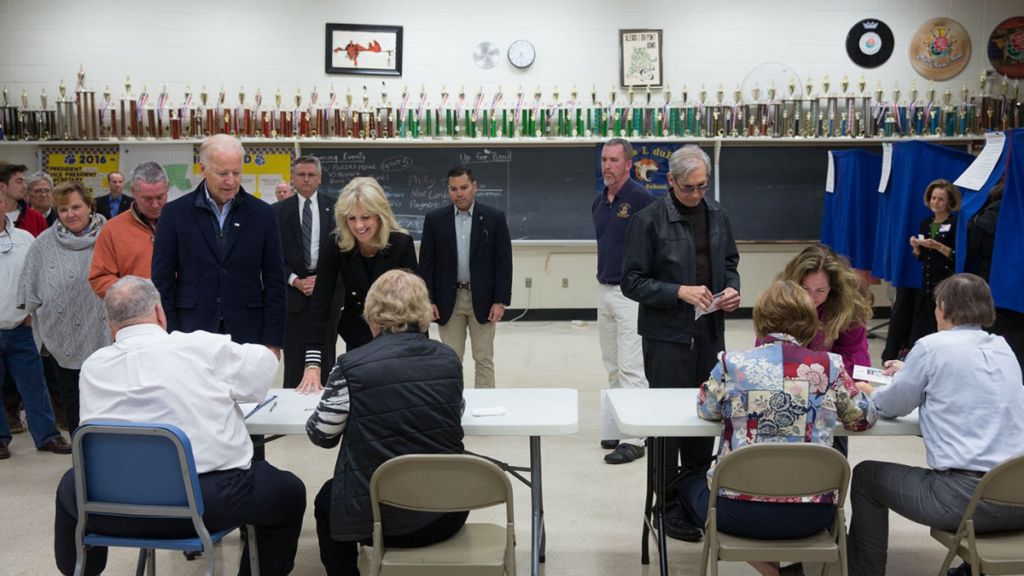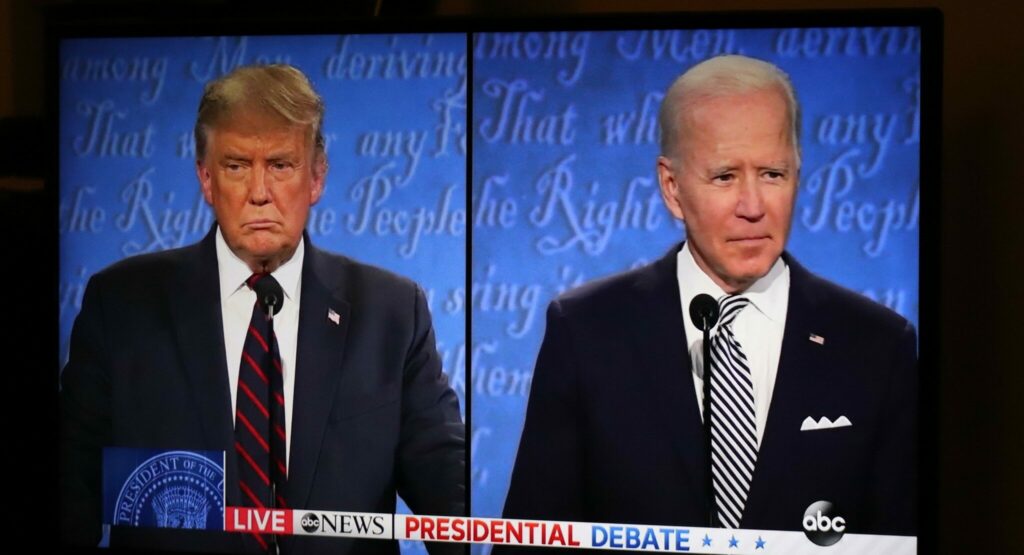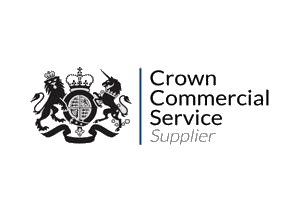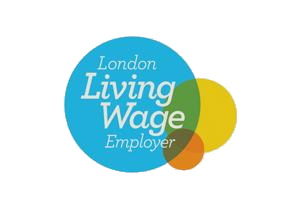Public opinion in Britain is at a crossroads. As the country gears up for a general election, we are seeing large fluctuations in party popularity with many voters displeased and / or ambivalent about many issues and political figures. One topic, however, dominates public opinion – the economy. Which party can cater to people’s needs in this area sufficiently? In the same way the Conservatives ‘owned’ Brexit in 2019, Labour ‘owned’ the NHS in 2017, and the Liberal Democrats ‘owned’ constitutional reform in 2010 – who ‘owns’ the economy in 2024’s debate?
What is 'issue ownership' and why is it relevant?
Rooted in the electorate’s perceptions, issue ownership represents the phenomenon through which one party is considered by the public as the most competent on a given issue. It galvanises support from the electorate in this arena as the party becomes associated with the issue itself. One example of this phenomenon are green parties across Europe ‘owning’ the discourse surrounding climate change, emissions, and sustainability.
Structuring a campaign around an issue is an efficient and safe means of developing an electoral strategy. Once a party identifies the issue it can dominate, it can then focus the majority of its electoral efforts into convincing voters they are competent enough to govern. The UK is certainly no stranger to such tactics. Many past elections have been, to a greater or lesser extent, fought and won on single issues of high importance to the electorate. This dynamic was seen most acutely in 2019 and the ‘Brexit election.
Why do we care about the economy?
Recent data indicates that the economy is one of the most burning aspects of today’s life in Britain. Figures from the Office for National Statistics indicate that the cost of living crisis is considered the most important issue facing the country right now, with 88% of respondents listing it as their most challenging issue. The next most considerable issue is the economy at 75%. With this measure of the electorate’s concerns all the signs are pointing towards an election that will be primarily fought over the management of the economy.
Aside from being one of the most salient issues in Britain, the economy is also the most contested one. Data from YouGov collected in 2024 reports that British people see the economy as the issue on which the Conservatives and Labour have the most different stances. Not only is the economy something most voters will be concerned with when casting their ballot, it is also perceived as a polarised arena. This will lead to more dispute over the matter and, implicitly, to a greater popularisation of the topic – when this occurs, the stakes become higher in the eyes of voters.
Which party owns the economy then?
Labour has, since September 2022, led the Conservatives on this topic when voters were asked which party would handle the economy most competently. This is a considerable reversal of fortunes – just five years ago, 12% of voters believed Labour would be the best to manage the economy to the Conservatives’ 34%. Now, Labour’s performance in this respect has more than doubled and now lead the Conservatives 25% to 19%. Just a few months before the 1997 general election, the Conservatives held a 4% lead over Labour. Just days before, this lead actually grew to 7%.
However, while we might be inclined to believe that we are witnessing a change of issue ownership, we need to question whether this apparent role swap is meaningful. We are living through a period of a decline in the Conservatives’ approval across the board, which means implicitly that Labour is (and ought to be) polling better by comparison.
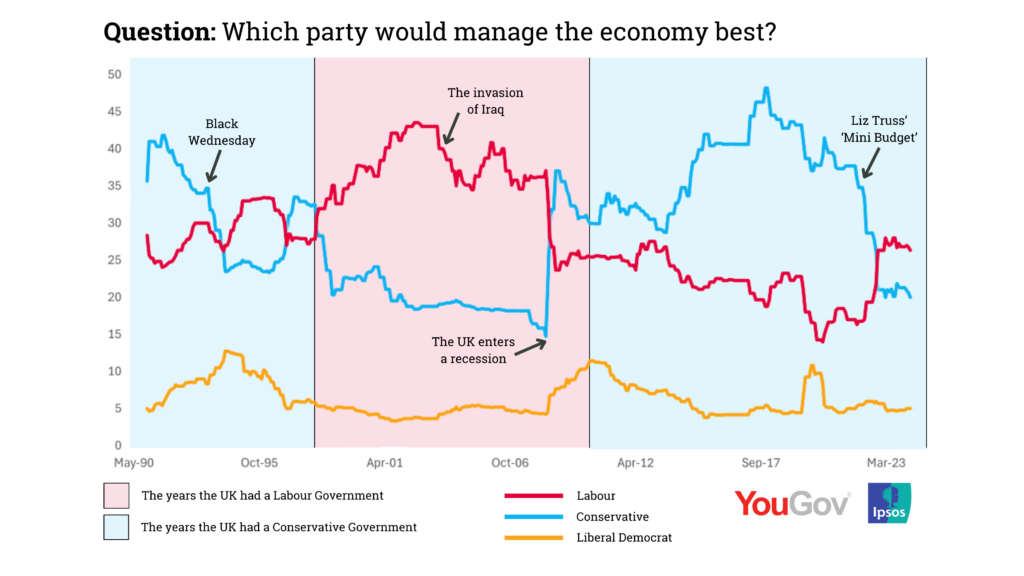
This can be observed in the context of traditionally Labour-owned issues. For example, although Labour has been consistently deemed the most ‘competent’ party to handle the NHS according to YouGov data, the percentage of people nominating them as the best party at handling the NHS has been increasing since 2022. We can see a similar phenomenon in the YouGov polls on handling education and schools, where until the middle of 2021 Labour and the Conservatives have been intersecting, with Labour maintaining a relative advantage. Since then, Labour has polled over the Conservatives, with a significant increase in popularity since 2022.
The Conservatives have never performed particularly strongly on these two topics, and a rather stable gap between the parties is to be expected. However, we are indeed seeing increases in Labour’s perceived competence for no apparent reason, indicating that public opinion is shifting more towards Labour regardless of their competence on issues. Perhaps this is a mindset from a public wanting to ‘give Labour a go’ regardless of whether or not they agree with them.
Could this be the case for the economy as well? Is the public placing Labour as a leader on the topic simply due to the decrease in Conservatives’ popularity? Or is there actually a meaningful shift of ownership towards Labour?
One cannot be sure of this change, but it is an unavoidable reality that Labour has a great advantage in the economic domain, owning public opinion – it is up to the party to take advantage of it and begin addressing the management of the economy from the position of an issue owner.


